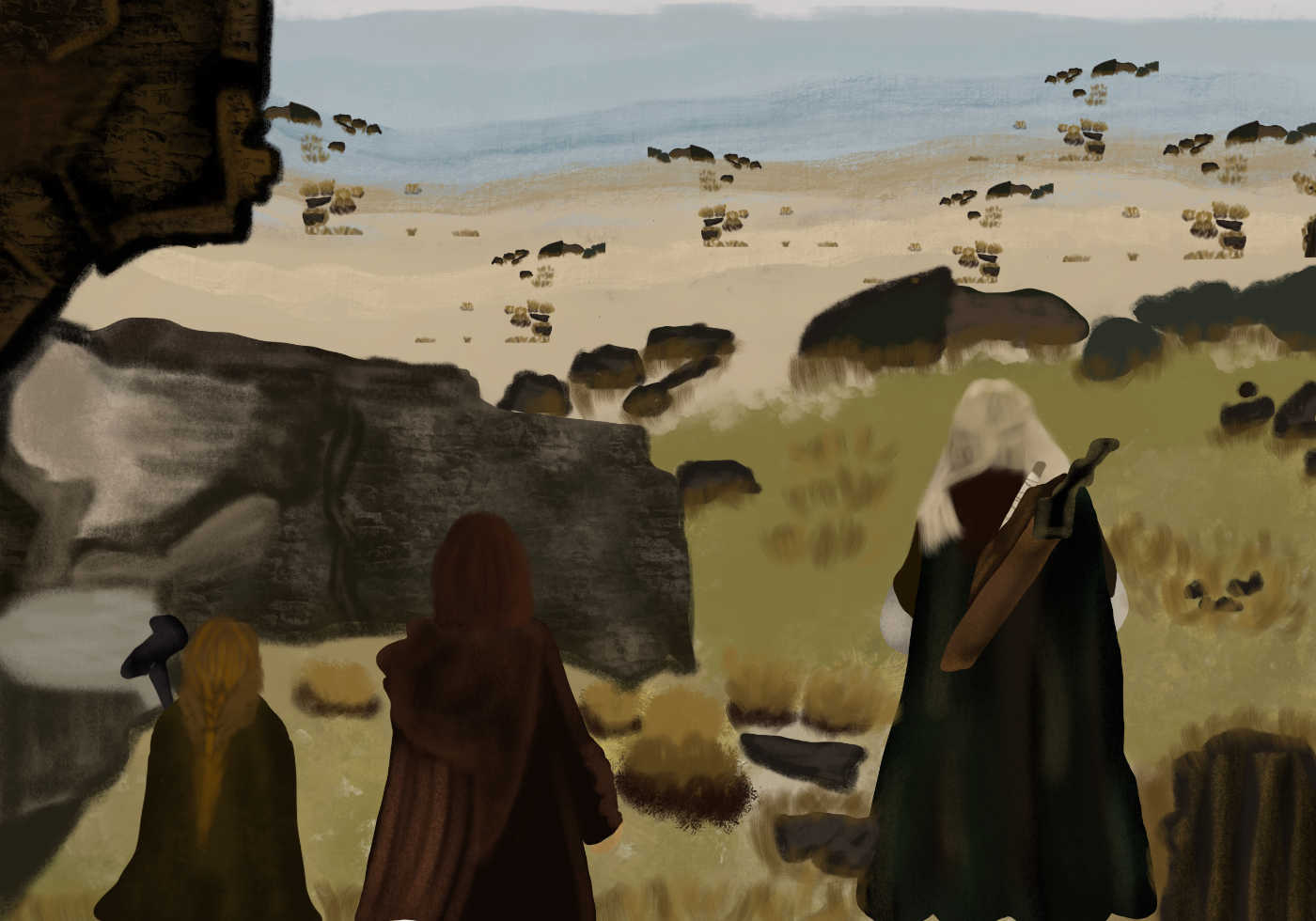Without a word of greeting, a sound of accompanying music in a darkened hall, there stands Faramir facing his father’s judging expression. It is not the only judgment we see, but disgust, anger, and resentment as well. With the confidence in having done the only right thing he could, Faramir stands before his father without a trace of guilt. This enrages Denethor even further.
Denethor believes Faramir should feel guilty and ashamed. There is no excuse for his behavior. There are no words that can resolve him from the treachery he had committed against his own father.
Harsh judgment
Denethor: “This is how you would serve your city? You would risk its utter ruin?”
Faramir: “I did what I judged to be right.”
Denethor: “What you judged to be right? You sent the Ring of Power into Mordor in the hands of a witless Halfling. It should have been brought back to the Citadel to be kept safe. Hidden. Dark and deep in the vaults, not to be used. Unless at the uttermost…end of need.”
This could easily be classified as verbal and emotional abuse. Not only are the concepts of right and wong lost on Denethor, but they differ widely from that of Faramir. It is a wonder Faramir kept his morals intact given his tyrant of a father.
Even though Denethor’s words pierce Faramir’s heart visibly, he holds his ground and remains unmoved in his decision. He did judge right in his decision, although he knew the outcome will prove to be painful.
Denethor’s perspective
Denethor considers Faramir’s judgment as laughable. From his point of view, it does appear to be somewhat inconsiderate. To be fair, none of the people of Gondor, apart from Faramir, have ever encountered a Hobbit, and they cannot know what they are or aren’t capable of. All they know about them is they are Halflings, meaning uncultured, uneducated, unwise and incapable of anything.
Therefore, to let them leave with the Ring of Power into the land of its creation could be construed as madness. They could easily lose the Ring, use it or simply be overpowered by the enemy himself and the Ring would once again have its rightful owner.
This perspective is not an unreasonable one, given the stereotype, Denethor holds for the Hobbits. So, in his mind, logically, Faramir had handled the situation badly. He should have brought the Ring back to the Citadel, so it would be in the safe hands of wise Men who would be able to wield it if the situation required it. All in all, not a bad idea.
Greed
Even as Denethor speaks of the Ring being hidden in the vaults of Minas Tirith, there loom greed and a need for possession in his eyes. The expression his face presents is one of desire. The power of the Ring, even though long out of reach, still poses a grave threat to Denethor’s sanity. Even the idea of it drives him to unbound thoughts. It borders on a dangerous fantasy one might have on acquiring the greatest power and unleashing it on the world.
Denethor’s duties as Lord and Steward aren’t being carried out as they should, and the fate of his people means less than nothing to him, imagine what the power of the Ring would summon in his possession. Not only would he ignore his responsibilities to his people, but his unfulfilled vain wish of becoming King would finally have to be enforced.
He would finally be able to declare himself King of Gondor, however briefly, because no matter what his desires be the Ring would always stray back toward its true Master. This, however, is not something Denethor is aware of.
Integrity
I would not use the Ring. Not if Minas Tirith were falling in ruin and I alone could save her.
Faramir
The determination with which Faramir states his unwillingness to use the Ring is very admirable. Even if all he loved and all he had given his life to protect were crumbling to pieces, he would not use the power of the Ring to save his land, for he has seen the influence the Ring has over its bearer. He is aware that no living being, no matter how resistant would succumb to its power sooner or later.
Faramir has seen the burden Frodo carries not only physically and emotionally but mentally as well. There is no way to ignore the Ring’s power, not even if it were safely stored away in vaults. He himself has felt the call of the Ring, in that one instance, it reflected on his sword while he held it at Frodo’s chest. Even at that moment, he could feel the summoning power of that little golden circle.
Kings of old
Ever you desire to appear lordly and gracious as a king of old. Boromir would have remembered his father’s need. He would have brought me a kingly gift.
Denethor
It is unbelievable how Denethor dismisses his son’s efforts in the most heartbreaking way possible. He also compares Faramir to the kings of old that might have reacted the same as he. Denethor does not believe that Faramir’s choices are his own, but rather an imitation of those of great kings.
The fact that he compares Faramir to the old kings also tells us that he does not count himself among the same company. Being lordly and gracious is an admirable trait, and not to possess it would make one a lesser ruler. This is the conclusion that Denethor brings upon himself. He is undeniably extracting himself from any form of lordliness and grace.
Denethor’s own views of being a Lord and Steward differ greatly from those who once successfully ruled Gondor. Although the line of Kings had ended, leaving the sole heir to the throne to prove himself worthy, Faramir still brings out the qualities that are sorely lacking in Gondor’s rule. He might not be in line for the throne of Gondor, but his qualities resemble that of a worthy Steward in the making.
In Boromir’s shadow
As it is his nature, Denethor uses his old argument of Boromir’s supremacy over his brother to degrade Faramir even more. Boromir would have accomplished the task his father had given him and the Ring would have already been in his possession. Boromir could do no wrong in Denethor’s eyes, more so now that he is gone.
Denethor never knew his firstborn, for if he had, he would have seen the fear in his eyes as he spoke about the Ring before Boromir left for Rivendell. He would have seen the anguish that only the mention of the One Ring awakens in him. Boromir knew himself well enough to know his weakness and temptation he would suffer in the presence of the Ring.
Sadly, Denethor thought Boromir greater than God, able to withstand any temptation and any seduction the Ring might pose.
The truth about Boromir
Faramir: “Boromir would not have brought the Ring. He would have stretched out his hand to this thing and taken it. He would’ve fallen.”
Denethor: “You know nothing of this matter.”
Faramir: “He would have kept it for his own! And when he returned, you would not have known your son.”
Denethor: “Boromir was loyal to me! Not some wizard’s pupil!”
To confront one’s own father about the vulnerabilities of his fallen son takes courage. Sam, in his effort to free himself and Frodo from their captors in Osgiliath, blurted out the truth about Boromir’s death. Faramir could have chosen not to believe him and retained the image of a strong and infallible man, however, the truth of Sam’s words rang true in Faramir’s ears, bringing to the forefront a flaw in Boromir’s iron defense mechanism.
Faramir had seen the look in Boromir’s eyes as he was leaving for Rivendell, and in his expression there lied the last goodbye, sadness, and recognition of defeat. Boromir only went to join the Council of Elrond to please his father, but he would have been happiest remaining in Osgiliath with his people.
Faramir speaks the truth about Boromir to his father. However, no amount of words will ever be enough to shatter the perfect image Denethor still holds of his firstborn. Nothing can deter the belief that Boromir would have been strong enough and brave enough to bring the Ring to the Citadel.
The fact that the Ring would have changed Boromir’s internal constitution and he would have become unrecognizable to his father does not sway Denethor’s beliefs. Even though his behavior was such that it brought about uncontrollable rage and almost fatal consequences to Frodo, without having seen it with his own eyes, Denethor is disinclined to believe it. Perhaps if he had seen it, he would have changed his mind about him, or not even then.
Disloyalty
What hurts Denethor most is Faramir’s apparent disloyalty to him. There are, however, two ways of looking at this:
Faramir is loyal to his father in the sense that he stands now before him, defending his decisions and reasonably arguing the case of Boromir. Knowing that he would get in trouble by making the right decision, he could have gone into exile and lived on without his father’s judgment and abuse. However, he returned home to face him and receive his punishment.
From Denethor’s perspective, Faramir might be judged as disloyal, because of him not bringing the Ring to Minas Tirith. To be loyal to someone is to be there for them in times of need, being able to make the right decision if one party is in any way incapacitated and protect in every way possible. It does not mean to follow someone blindly.
One has the opportunity to think for oneself and make decisions based on one’s own morals and integrity. Faramir has done everything he could to protect, make sound decisions and serve his country in a time of need. His loyalty extends over his father’s selfish wishes. He needs to consider the good for all his people. That is exactly what he had done.
The fact that Boromir would have taken the Ring for himself, gotten internally mutilated by its influence only to bring it to his father, would be an act of lunacy. It would have distorted the image Denethor has of his son and it would put the whole of Middle-Earth in greater peril than it faces now. And in the end, Boromir was able to distinguish between doing the right thing and following his father’s orders.
His father, however, would never be able to appreciate his sacrifice. He would always look at it as a tragedy, robbing him of his only good son.
Hallucination
Faramir: “Father?”
Denethor: “My son!”
As Denethor’s anger over Faramir’s explanation of Boromir’s behavior reaches its boiling point, he stands abruptly from his throne yelling at Faramir for his blasphemous words. In his weakened state, he falls to his knees, sobbing and crying, with Faramir offering to help him stand. At that precise moment of weakness, a most welcome hallucination of his firstborn appears behind Faramir’s shoulder.
Denethor looks at Boromir with tears of joy and exultation, as Boromir smiles back at him. Boromir starts to approach his father’s throne, Denethor extends his hand awaiting the touch of his hand. Sadly, the hallucination stops short of Denethor’s reach and fades away. The expression of sudden joy turns to sadness, then grief ending ultimately in anger.
How much grief and sorrow must he suffer if a hallucination of his late son appears as vivid as if he were really approaching him? How strong is the longing, the yearning to see him and have him alive again? To experience such an incredibly powerful range of emotions in an instant, only to be brought back to reality. A reality Denethor sees no point in pursuing. How strong a loss must it be to completely ignore his living child standing in front of him, only to embrace a fleeting hallucination.
Leave me!
Denethor
Denethor is disgusted with the image that has been left behind, the image of his only son.
Seeing only Faramir before him now, Denethor orders his son to leave. Faramir hesitates for a moment, incredulous of his father’s order. However, seeing there is no more to be said or done he leaves the hall.
Follow the story of Frodo and Sam in my next post.
Photo by ᴊᴀᴄʜʏᴍ ᴍɪᴄʜᴀʟ on Unsplash





